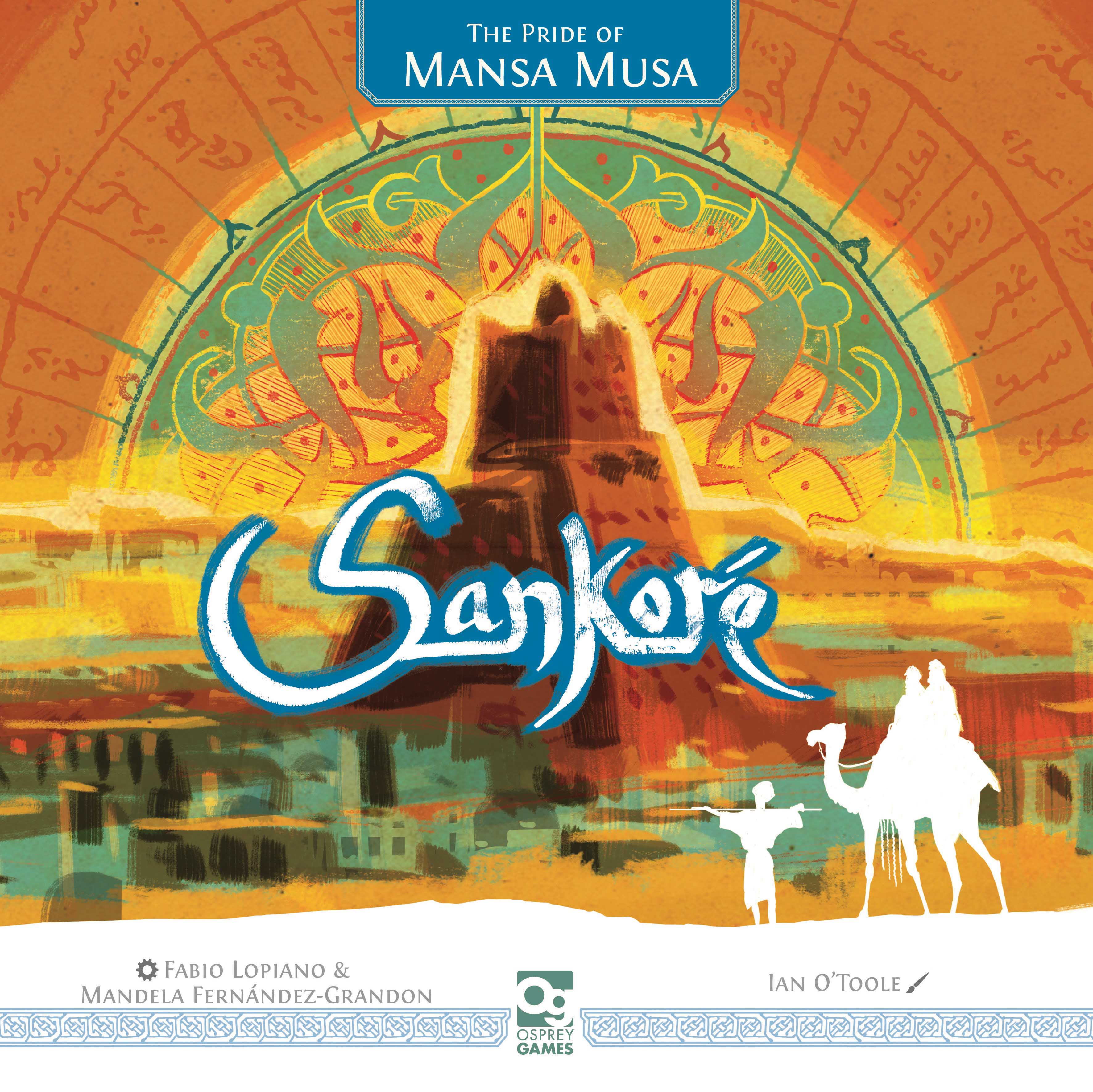
Our interactive eurogame Sankoré is out now. We're very proud to share the first instalment of a 2-part, behind-the-scenes blog series from designers Fabio Lopiano & Mandela Fernández-Grandon...
Introduction
Our new game Sankoré: The Pride of Mansa Musa, is a follow-up to Merv: The Heart of the Silk Road, with which it shares a similar aesthetic. Although Sankoré has entirely different mechanisms, we think it will fit quite nicely alongside Merv for those who enjoy interactive Euro games, historical settings, interesting scoring systems, and camelids.
The Idea
Fabio:
In October 2020, the design process for Autobahn was mostly done, so I started thinking about some interesting themes for the next game. One of the first ideas that came to mind was about the gold/salt trade routes across the Sahara under the reign of Mansa Musa.
|
First board for the ‘Mansa Musa’ prototype. The map layout will more or less survive until the final version of Sankoré. |
At the very first iteration, it was just a simple pick up and deliver game where players were crossing the desert with their caravans. As I began my research process about that period, I read about the University of Sankoré and how books were even more valuable than gold or salt at the time, so I started thinking about how to incorporate that in the game.
Just around that time I got a message from Mandela, proposing to collaborate on a new game.
Mandela:
We started brainstorming what was important to us and what would be important for the setting of Sankoré. Five days later we had a working prototype and were ready to really get to work. We’ll talk about some of the key points in the design, but first it might be good to explain a bit about the setting.
Background
Fabio:
During the reign of Mansa Musa, the Emperor of Mali, his dominion expanded to encompass the gold-rich territories in the South and the pivotal hubs where caravans embarked on journeys across the Sahara Desert to the Mediterranean Sea and the wider Islamic world. Through this strategic control over both gold production and distribution, Mansa Musa became the wealthiest individual in history.
Within the empire, an even more valuable commodity was salt, essential for preserving food in the humid sub-Saharan climate. This vital resource was mined in the desert, prompting caravans departing from Timbuktu to set out laden with gold and return laden with salt.
Yet, perhaps the most precious commodity of the era was knowledge. In his pursuit of transforming Sankoré into one of the most esteemed universities of its time, Mansa Musa invited scholars from renowned centres of learning across the Islamic world. During this period, the collection of manuscripts at Sankoré began to flourish, eventually evolving into one of the world's largest libraries.
In our game, players step into the roles of scholars, each heading one of the schools that constitute the University of Sankoré. They enrol students, teach them lessons, and establish new classes within their schools. As students progress in their studies, they eventually graduate and gain positions of prestige within the empire.
The game features four primary disciplines: Theology, Astronomy, Mathematics, and Law. In the real 14th century Sankoré, students would apply the skills they were learning. Hence in the game, you find yourself teaching a discipline yet interacting with some part of the wider town/neighbouring town/neighbouring empires.
As the game unfolds, players accumulate prestige in these fields through various means, and at the game's conclusion, they convert their amassed prestige into victory points. The key determinant of this conversion is the distribution of books from these four disciplines within the library of Sankoré.
Key Ideas
Mandela:
We discussed what we felt were the essential themes of this setting. Those key elements from that early discussion did make it through to the final version of the game: each player is running a school within the University of Sankoré, they enrol students, establish classes, students progress with their studies and eventually graduate.
We also had a few more mechanical ideas that, through several iterations, found their way to the final game as well: the circular economy of gold/salt/books, an unconventional way of scoring, and the concept of knowledge increasing during the game.
It was also important that knowledge was a resource which was not expended in a conventional way. It didn’t seem thematically resonant that a player would spend knowledge somehow reducing it, so we settled on the idea of a virtual resource.
Fabio:
We kept this idea that knowledge determines the efficiency of each action, and that knowledge always grows, both as a shared resource across the whole university but also with a private component, depending on how much your school has specialised in a specific discipline.
We also nailed down the four disciplines pretty early in the design process, although for some of them it took a very long time before we could finalise the details.
Resources
Fabio:
One driving principle in the design of this game was that we didn’t want players to alternate between turns where they gather resources and others where they spend them. Instead we designed the teaching of the four disciplines so that each one would convert one type of resource into more of another type, while at the same time improving your position on the board. This way, you always have a feeling of growth and you never feel like having wasted a turn just to get that extra resource you needed.
Teaching Astronomy places Marketplaces on trading posts in the desert, spending Gold to gain Salt (from the salt mines in the Sahara); teaching Theology places Mosque pieces on a city within the empire, spending Salt to gain Books (representing their school establishing a relationship with that city mosque, and copying one of their books); teaching Maths places a Wall around the Sankoré Madrasah, spending books to gain Gold (i.e. Mansa Musa rewards them for contributing books to the Sankoré library).
This resource loop where each discipline converts one of the main resources into the next became a key aspect of the game, and pretty early we added a simple diagram to the main board that was really appreciated in playtests and survived into the final product.
Law
Mandela:
Though we did mess around a surprising amount with the caravan movement for Astronomy – vastly overcomplicating it before settling on something sufficiently simple yet effective – the core of Theology, Astronomy, and Maths was locked in pretty early.
That left us with Law. Originally we wanted Law to interact directly with Mansa Musa, a piece that moved around the board, having a say in legal matters and influencing the empire in a more general way. However, this roving Mansa didn’t work in a heavy game like this where you need to be able to plan your turns. There is a certain complexity budget to work within for any game and with people’s focus elsewhere the system couldn’t dominate too much of their thought and should follow the same basic pattern as the other disciplines to keep learning the game more intuitive.
Within the existing framework of the game, we came up with system after system to fit this role. In our final system, you visit the court of Mansa Musa and return with Skill Tiles. These are meant to reflect new academics you meet coming to contribute to your curriculum within their specialty. They provide an engine within each discipline so that when advanced classes are taught they will generate benefits. The classes which form your curriculum are themselves a form of Tech Tree which you can construct each game, and this lets us lean into it further by letting you customise each discipline slightly in every play.
Fabio:
Here are just some examples of our several attempts at a Law action (I think we had at least a dozen different ones):
(Nov 2020) In one of the very first attempts, when teaching classes you advanced your marker on one of these four tracks, which can unlock access to some slots of the corresponding area.
We had these locks for a while, but then eventually they were replaced by 'supported classes', i.e. in order to access the more powerful slots of each discipline, you need two students in the class.
(Dec 2020) In this iteration, when you did the Law action, you would move the Mansa Musa pawn to one of the other three discipline areas. Whoever took an action in the area with Mansa Musa would get a favour from the emperor.
(Jan 2021) At this point we already had each area split into four regions, which would score at specific times in the game, so here we are back to four tracks, so that whoever is ahead in the track will gain the scoring prize. When teaching a Law class, you advance on one track of your choice, up to your knowledge and gain the bonus where you land (this eventually would turn into the favour track).
(Nov 2022) And this was the final version, where now, instead of getting the bonus, you gain a skill tile to add to your school, which will trigger when you teach a matching advanced class (we settled on something like this around June 2021).
Scoring
Mandela:
Aside from the things we thought would capture the setting, we each had a couple of desires from the next game we designed; I wanted continuous play (no set rounds), and Fabio wanted non-standard scoring in which you needed to be conscious of scoring and it wasn’t just a given. I don’t know what point salads ever did to Fabio or his family to build such a grudge, but it did make for an interesting design challenge.
Fabio:
I generally try to avoid a “point salad” approach, where anything you do in the game always awards you some victory points. I much prefer systems where players have to be more deliberate in how they score their victory points. A hint of this was already present in Merv, with a good chunk of victory points generated by the courtiers in the Palace working as score multipliers for different things you did throughout the game.
In the earlier iterations of the game, the conversion of prestige into victory points was tied to the students you graduated in each discipline, but soon after we had a better idea: in order to also tie in the library of Sankoré and make sure that books were indeed a very valuable resource, we decided to tie the value of prestige in each discipline to the amount of corresponding books in the library.
This made the game way more interesting: every time you spend a book, it is not returned to the supply, instead it is added to the library. The library has a number of shelves, and, at the end of the game, the most numerous books of each shelf will determine the value of prestige in the corresponding disciplines.
This makes the game very tense until the end, as spending a couple of books on the right shelf in the last round could completely change the outcome of the game.
Mandela:
The library really became the core of the game, as thematically we felt it should be. But this does lead to some things counterintuitive to how us eurogamers have been trained. Books are the rarest of the standard resources and do grant access to important actions in the game, however, contributing them to the library is the only way to have your say in what will score well. While it’s tempting to hoard books and optimise your efficiency, there is often a point in the game where you start to wonder how you can get them out of your possession and into the library.
This makes the decision around actions and spending books richer and more evocative of the setting; manuscripts are highly valued and maintained in personal libraries across Timbuktu, but contributing them to the shared Sankoré library is how you will help push the discipline forward and get wider recognition.
Another consequence of this system is that scoring can mislead people about how close a game is. It is easy to end a tightly fought game, and still have one player with a dramatically higher score than another due to them edging out a discipline in the library. It’s tempting to give people a game where they get the satisfaction of very tight scores, but we were really pleased with how much this puts into players’ hands.
Ultimately, it is not a game where you can compare your own high scores, rather you must remember that winning is just about outscoring your opponents...
We'll be back with the second half of the design diary this weekend!
Sankoré: The Pride of Mansa Musa is out now in the US and UK.

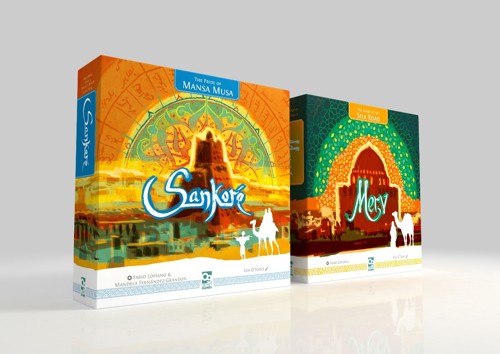
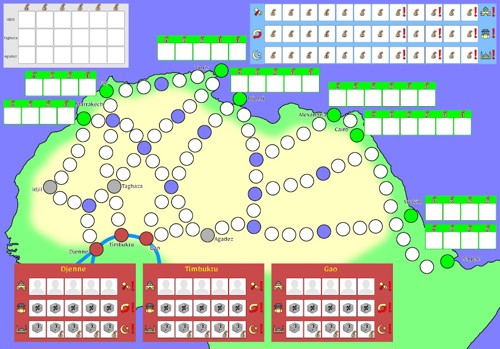


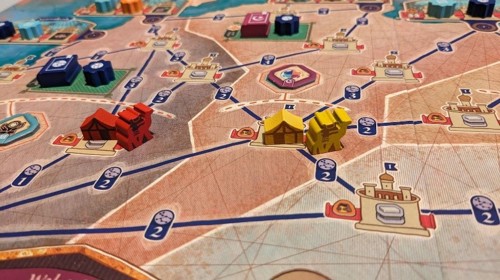
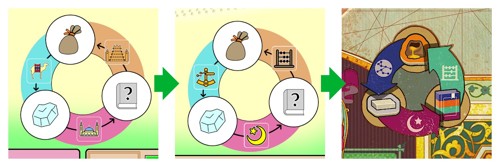
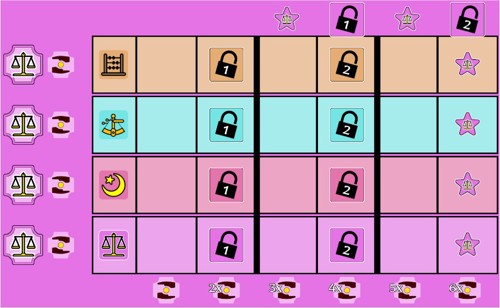


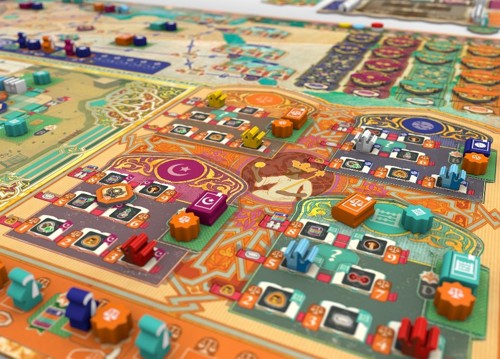
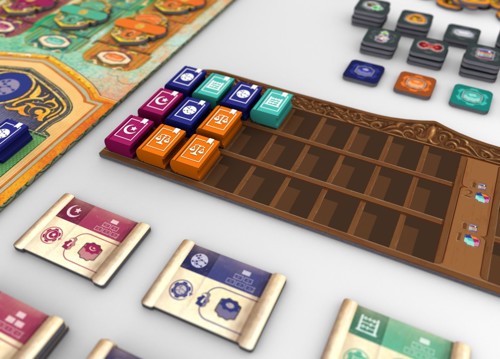


Comments
You must be logged in to comment on this post. Click here to log in.
Submit your comment